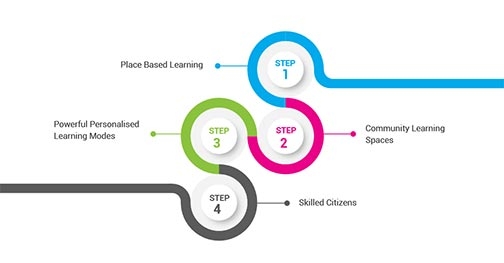The Australian Learning Communities Network Inc (ALCN) was formed in 2001. ALCN is a network of leading edge practising agencies building sustainable communities using learning as the key driving element.
It now has a membership comprising around 38 learning communities around Australia, represented by lead agencies such as local government, Adult Education Centres, Private Organisations, Libraries, Community Centres, Universities, Charitable Organisations, Peak Learning Bodies, Youth Agencies and Technical and Further Education Institutes. The lead agencies have formed, within each learning community, a network of partnerships comprising business, local government, education, government authorities, community interests, libraries, and support services agencies.
The ALCN recognises that the aims and goals of most organisations/groups cannot be achieved in isolation and there is a need for partnerships within the community. The emphasis needs to shift to strategic alliances and partnerships, improved linkages between stakeholders such as education, vocation, technology, employer groups, government agencies and regional development.
The ALCN framework has several aspects:
- Taking a national leadership role in learning and education.
- Recognised that learning is the key to addressing social and economic disadvantage and the need towards improving access to and outcomes from learning.
- The framework developed by the ALCN members is unique and provides, with network of members and their partners an independent community/business based platform and “neutral space” for widespread community development and change.
- The role of members and their partners goes well beyond sponsorship, to facilitating community development.
Naturally since Learning Communities work from the “ground up”, they address diverse learning needs and development. Some of the more prominent are:
- Shire of Gwydir (NSW) which concentrates on training and employment opportunities in a small rural area.
- The City of Hume (Vic) which works on particularly bringing cohesiveness to a very diverse multicultural city on the outskirts of Melbourne.
- The City of Melton (Vic) which focusses on economic development in the area again on the edge of Melbourne.
- The city of Townsville (Queensland) which is successful in promoting learning in all its aspects in a variety of ways
In general, the handicaps to the development of learning communities within Australia is
- Acceptance of the concept by some organisation within the local community
- The need for the development of a committed and skilled coordination team
- The need for the application of resources to the various identified projects
Jim Saleeba
Hon CEO
Australian Learning Communities Network Inc
Links: + Pascal Observatory, Cradall Center for Research & Development in Adult and Lifelong Learning (Glasgow University)
